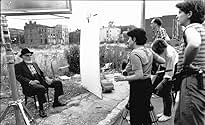Histoires d'Amérique: Food, Family and Philosophy
- 1989
- 1h 32min
PUNTUACIÓN EN IMDb
6,7/10
175
TU PUNTUACIÓN
Una narración humorística de las historias de inmigrantes judíos en la ciudad de Nueva York.Una narración humorística de las historias de inmigrantes judíos en la ciudad de Nueva York.Una narración humorística de las historias de inmigrantes judíos en la ciudad de Nueva York.
- Premios
- 1 nominación en total
Imágenes
Argumento
¿Sabías que...?
- CuriosidadesFilm debut of Kirk Baltz.
Reseña destacada
This is the first film I've seen by Chantal Ackerman, and I'm mixed as to see more of her films. I see so much here, even as I have personal criticisms of certain things in her style. I wondered when the film would end at times (not knowing the running time seeing it), and its shifting between rye, sly Jewish jokes and sad tales of Jews escaping the horrors (or not) of holocaust and the working-class immigrant's life, is very unexpected. But then again, the film has the feel of being a hybrid of documentary and fiction, with actors (there's character Kirk Baltz somewhere in there) and perhaps non-actors or really off-off Broadway people. As I was told, this is in the tradition of black-box theater, in particular Jewish ones, and its filmed with an invariable European feel and mood by Ackerman. Certain jokes were very amusing (there's even one that was featured in Coming to America!), and others that reminded me of the 'it's not funny but hmm' feeling of those in Jarmusch films.
The stories told are very long, and the shot-lengths go neck-and-neck in competition with other art-house filmmakers to be some of the longer ones in cinematic memory. Sometimes there is movement to the film, as in the brief, interesting conversations with the older characters. And there is some nice, understated dialog in the 'restaurant' scenes. It's really for a specific audience, and is unique for better or worse, the kind of underground movie that has a lot to ponder about the Jewish-American (and European, mostly Polish, Jewish) experience. Some of the stories, indeed, are rather horrific in scope, while others question what life is living in the less-classy side of the city of New York. And the film is given not only a beautiful opening image of the city from a small boat, but a brilliant end scene with an old man in the middle of a field, recanting a very sweet story. Hard to find (watched it in a class), and was glad to watch, once, as a good introduction to Ackerman.
The stories told are very long, and the shot-lengths go neck-and-neck in competition with other art-house filmmakers to be some of the longer ones in cinematic memory. Sometimes there is movement to the film, as in the brief, interesting conversations with the older characters. And there is some nice, understated dialog in the 'restaurant' scenes. It's really for a specific audience, and is unique for better or worse, the kind of underground movie that has a lot to ponder about the Jewish-American (and European, mostly Polish, Jewish) experience. Some of the stories, indeed, are rather horrific in scope, while others question what life is living in the less-classy side of the city of New York. And the film is given not only a beautiful opening image of the city from a small boat, but a brilliant end scene with an old man in the middle of a field, recanting a very sweet story. Hard to find (watched it in a class), and was glad to watch, once, as a good introduction to Ackerman.
- Quinoa1984
- 19 abr 2006
- Enlace permanente
Selecciones populares
Inicia sesión para calificar y añadir a tu lista para recibir recomendaciones personalizadas
Detalles
- Fecha de lanzamiento
- Países de origen
- Idioma
- Títulos en diferentes países
- American Stories: Food, Family and Philosophy
- Localizaciones del rodaje
- Empresas productoras
- Ver más compañías en los créditos en IMDbPro
- Duración1 hora 32 minutos
- Color
Contribuir a esta página
Sugerir un cambio o añadir el contenido que falta

Principal laguna de datos
What is the French language plot outline for Histoires d'Amérique: Food, Family and Philosophy (1989)?
Responde


















